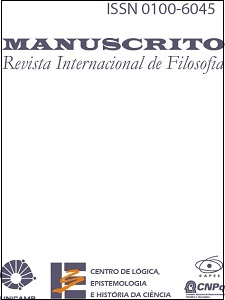Resumo
We investigate the relation between self-organization and living processes from a systemic perspective. Emphasis is given to Aristotle’s conception of four causes in order to provide foundations for a systemic approach to life. From this perspective, life is characterized as a self-organizing process that allows the emergence and evolution of systems capable of self-locomotion, in the Aristotelian sense of moving and growing.Referências
ARISTOTLE. On Generation and Corruption. Translated by H.H. Joachim,
Provided by The Internet Classics Archive. Retrieved February 12, 2005, from http://classics.mit.edu//Aristotle/gener_corr.html.
_______. On the Parts of Animals. Translated by William Ogle, 1996. Provided by The Internet Classics Archive. Retrieved February 12,
, from http://classics.mit.edu//Aristotle/parts_animals.html.
_______. Metafísica. São Paulo: Loyola, 2002.
_______. Physics. Translated by R. P. Hardie and R. K. Gaye, 1997. Provided by The Internet Classics Archive. Retrieved February 12, 2005, from http://classics.mit.edu//Aristotle/physics.html.
ASHBY, W.R. “Principles of the self-organizing system”. In: von Foerster,
H. & Hopf, Jr. G.W. (eds.). Principles of Self-organization. Oxford:
Pergamon, pp. 255-278, 1962.
BOHM, D. Wholeness and the Implicate Order. London: Routledge & Keagan Paul, 1980.
BRESCIANI FILHO, E., D’OTTAVIANO, I.M.L. “Conceitos básicos de
sistêmica”. In: D’Ottaviano, I.M.L., Gonzalez, M.E.Q. (eds.). Autoorganização: estudos interdisciplinares. Campinas: CLE/UNICAMP, 2000. (Coleção CLE; v. 30).
DEBRUN, M. “A idéia de auto-organização”. In: M. Debrun, M.E.Q. Gonzalez & O. Pessoa Jr. (eds.) Auto-organização: estudos nterdisciplinares. Campinas: CLE/UNICAMP, 1996. (Coleção CLE; v. 18).
D’OTTAVIANO, I.M.L., GONZALEZ, M.E.Q. (eds.). Auto-organização:
estudos interdisciplinares. Campinas: CLE/UNICAMP, 2000. (Coleção
CLE; v. 30).
GONZALEZ, M.E.Q. & HASELAGER, W.F.G. “Creativity and selforganization: contributions from cognitive science and semiotics”.
S.E.E.D. Journal - Semiotics, Evolution, Energy, and Development, 3(3), pp. 61-70, 2003.
HAKEN, H. (1999). “Synergetics and some applications to Psychology”. In: W. Tschacher & P.P. Daualder (eds.). Dynamics, Synergetics, Autonomous Agents. London: World Scientific, pp. 3-12, 1999.
_____. Information and Self-organization. Berlin: Springer Verlag, 2000.
HALPER, E.C. “Telos”. In: Audi, R. (ed.). The Cambridge Dictionary of
Philosophy. 2.ed. Cambridge: Cambridge University Press, 1999.
JAEGER, W. Aristoteles. Mexico: Fondo de Cultura Económica, 1997.
LOEWENSTEIN, W.R. The Touchstone of Life: molecular information, cell
communication and the foundations of life. New York/Oxford: Oxford
University Press, 1999.
MALHERBE, M. Qu’est-ce que la causalité? Hume et Kant. Paris: J. Vrin, 1994.
MATURANA, H.R., VARELA, F.J. Autopoiesis and Cognition: the realization of the living. Boston Studies in the Philosophy of Sciences, vol. 42.
Boston/Dordrecht: D. Riedel Publishing Co., 1980.
MATURANA, H.R. “Cognition and Autopoiesis: a brief reflection on the
consequences of their understanding”. In: G. Teubner & A. Febbrajo
(eds.). The State Law, and Economy as Autopoietic Systems. Milano: Giuffre Editore, 1992.

